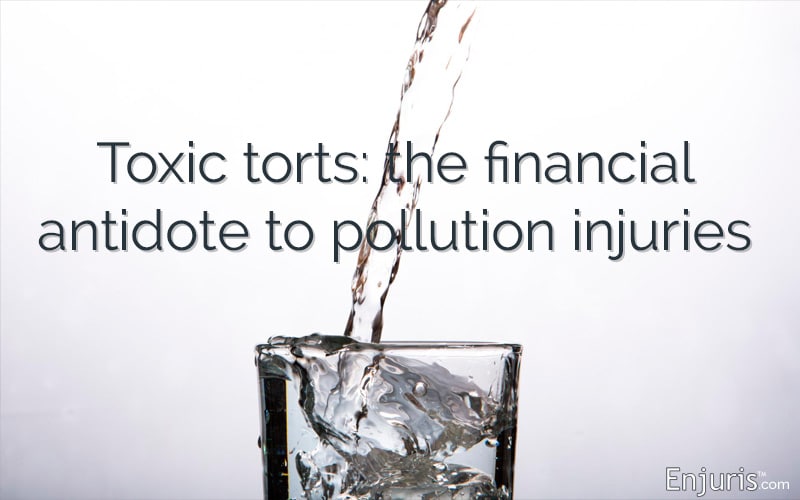Are you and your family getting sick from chemical exposure in your air, water, or soil?
Pollution isn’t just about toxins affecting the environment (though that’s important); it’s also a problem when toxins that pollute air, water, or soil affect our health. A toxic tort arises when a person or group of people is harmed as a result of exposure to some kind of pollution.
Many toxins are dangerous because you can’t see, smell, or taste them. Therefore, you might not know for years, or even decades, that you’ve been exposed. Even when you begin to experience negative health effects, or you might receive a diagnosis like cancer or asthma and not realize that the illness was ultimately caused by exposure to a toxin.
Injuries caused by pollution
Pollution comes in many forms, and its effects are wide-ranging. Personal injury cases from toxic torts can be for:
- Brain damage
- Developmental delays in children
- Birth defects
- Cancer
- Immune deficiencies
- Respiratory diseases (including asthma)
This is not an exhaustive list. Different people’s bodies have different responses to toxins. Even within the same home or workplace, people experience exposure in a variety of ways. For example, a baby who routinely chews on a window sill that has lead paint might experience more difficulties than a 10-year-old who breathes lead particles for a short time during a home renovation project.
When is pollution a toxic tort?
Pollution includes more than the black smoke that you see blowing from a factory smokestack or being expelled from the tailpipe of your car. Here are some of the most common examples of pollution that lead to Georgia toxic tort litigation:
- Lead paint
- Asbestos
- Contaminated water
- Mercury
- Toxic solid waste in landfills
- Pesticides
- Mold
- Defective drugs and medical implants
- Air contamination from gas or particles
- Radiation
How pollution affects you depends on the type of pollutant, quantity, length of exposure, and other factors specific to you. Sometimes, pollution is traced to a specific contaminant or polluter like a large corporation. In other situations, it’s the result of a lack of government oversight and monitoring.
Examples of pollution toxic tort cases
Brown v. Fort Benning Family Communities LLC
In Brown v. Fort Benning Family Communities LLC, a 2015 case before the U.S. District Court in Georgia, parents filed a lawsuit against a home rental community because their young son suffered brain damage as a result of lead poisoning from paint in their home. After the child was diagnosed with developmental delays, the Columbus Department of Public Health performed testing in the home and found lead levels higher than the federal standard. The case hinged on whether the landlord disclosed the lead dangers in the home. The Brown family was told before they moved in that lead in the home had been abated and there was no need for concern. This case led to additional investigations and calls for government oversight.
Class action lawsuit against Flint, MI officials (aka “Flint Water Crisis”)
Residents of Flint, Michigan, were exposed to high levels of chlorine in their water after the county changed the water source from Lake Huron to the Flint River. As the city became aware that the water contained high levels of disinfectants that could make people sick, it began to issue warnings about using the water supply. Residents began to show symptoms of mysterious illnesses that were connected to concerns about chlorine, other organic matter, and lead. A federal judge approved a $97 million settlement for the state to replace water lines for 18,000 homes. Other cases, including many in criminal court, are pending against Michigan officials for failing to prevent this harm.
How to provide a toxic tort case in Georgia
Duty, breach, and causation
A toxic injury case is based on three elements: duty, breach, and causation.
If the toxic tort is from exposure in your workplace or home, it’s often not difficult to establish a legal duty. A company is obligated to keep workers safe from harm. A utility that supplies water, energy, or other goods or services to your home also has a duty to maintain safety. Typically, the contract for purchase of your home contains warranties that the seller is not aware of toxins like asbestos, lead, radon, and other materials. That doesn’t mean that those toxins aren’t present—it means the seller isn’t aware of them.
A breach is when the party that had a duty to maintain your safety failed to do so. If your employer didn’t keep you safe on the job, it breached a duty of care. A manufacturer has a duty to sell a product that won’t cause foreseeable injury. Failure to disclose a dangerous condition can also be a breach of duty.
A personal injury lawyer who’s experienced in toxic tort litigation will know what expert witnesses to call and which strategies to deploy in court. Here’s what they’re likely to provide:
- Medical testimony from experts
- Evidence of exposure
- Evidence of illness in other people with similar exposure
- Product recalls (for an item, medication, or medical device)
The But For Test
The most important part of the legal case for pollution injuries and toxic torts is causation. You must show that exposure is the “immediate cause” of your injury and that you wouldn’t be experiencing harm but for toxic exposure.
This is not an easy standard to meet for pollution exposure and toxic torts. For one thing, it’s hard to prove that a health condition like cancer was caused by a toxin. You probably need to show that you have no family history of the condition and that there’s no other environmental exposure besides the one that is the subject of the lawsuit.
Hydrogen sulfide injuries in Georgia
Mining is a significant industry in Georgia, and there’s now expanded oil and gas exploration happening off the Georgia coast. Hydrogen sulfide (H2S) is a gas that smells like rotten eggs—likely the smell you normally associate with a natural gas leak.
It’s extremely dangerous to breathe in H2S, even in low concentrations. A person exposed to H2S might experience everything from headaches and eye irritation to unconsciousness or death.
This gas can occur naturally and is often in sewers, manure pits, well water, volcanoes, or oil and gas wells. However, it’s also produced in industrial processes that include:
- Mining
- Petroleum production and refining
- Hot asphalt paving
- Agricultural silos and pits
- Food processing
- Textile manufacturing (specifically, rayon)
- Pulp and paper processing
Sanitation workers, farm workers, and workers in oil and natural gas industries are most likely to be affected by H2S. The Occupational Safety and Health Administration offers resources and tips for keeping yourself safe from hydrogen sulfide.
OSHA Tips: Evaluating and Controlling Exposure to Hydrogen Sulfide in the Workplace
To protect workers from harmful hydrogen sulfide exposures:
- Evaluate exposure to know whether H2S gas is present and at what levels.
- Eliminate the source of hydrogen sulfide whenever possible.
- If the source cannot be eliminated, control exposures by:
- Using engineering controls as the next best line of defense.
- Developing administrative controls and safe work practices to reduce exposures to safe levels.
- Use personal protective equipment if engineering controls and work practices alone cannot reduce hydrogen sulfide to safe levels.
Georgia provides workers’ compensation insurance for chemical poisoning and related conditions if you can prove that the condition is the result of your job.
Exposure through the workplace isn’t the only cause of action for hydrogen sulfide.
One highly publicized Georgia pollution case involved air pollution claims by Effingham residents near the Savannah River Mill Plant of Georgia Pacific. The residents filed a lawsuit claiming that H2S emitted from the plant damaged electrical wiring, HVAC systems, refrigerator coils, and fire alarm systems. In response, Georgia Pacific closed the six active sludge cells that released the H2S and paid 31 households a total of $300,000 to repair and replace air conditioners. There are still ongoing legal claims in this case.
How to handle a toxic tort case
Toxic torts are serious business, and when you need money to cover medical bills, property remediation or repair, or ongoing treatment, you might need a lawyer to help. Fortunately, experienced Georgia toxic tort lawyers have the knowledge and resources to help you to get what you deserve from a pollution case.
See our guide Choosing a personal injury attorney.


